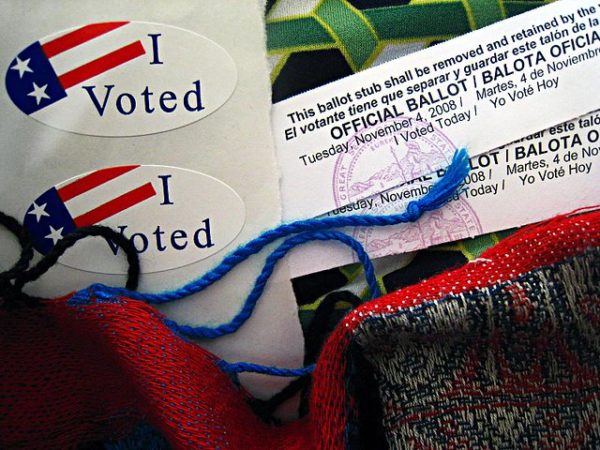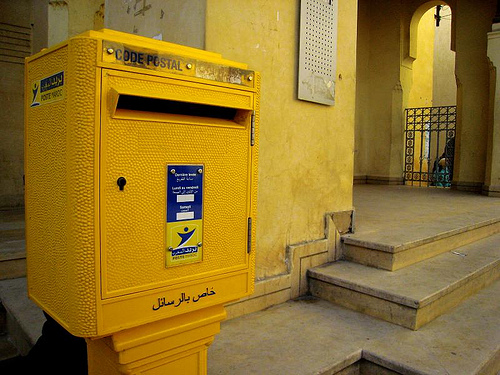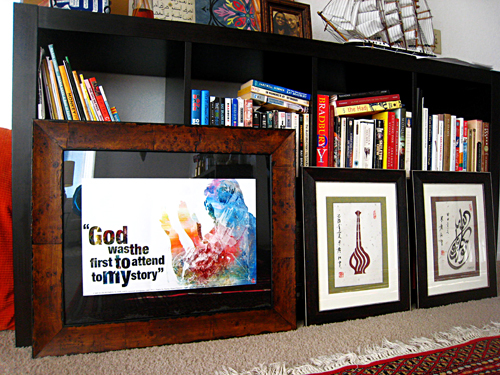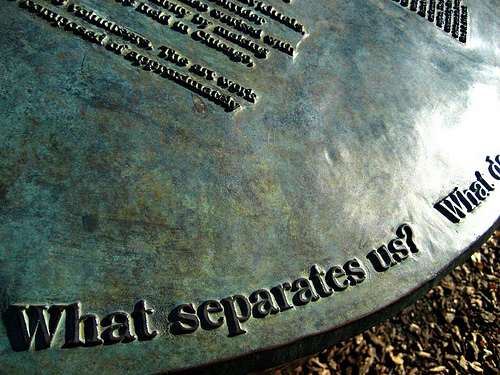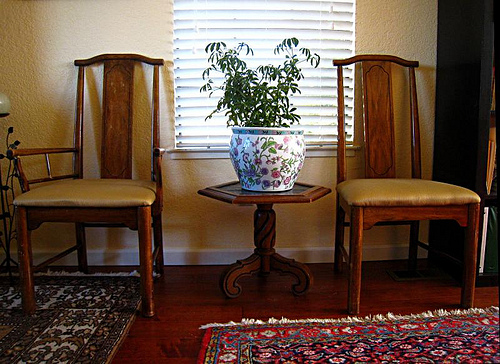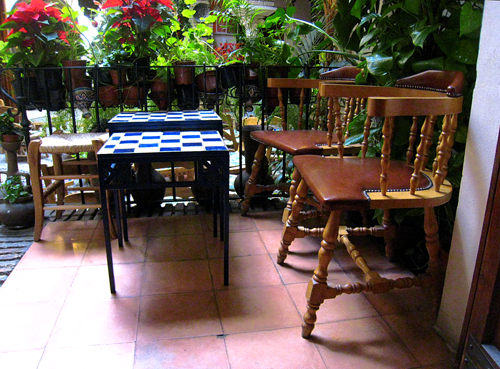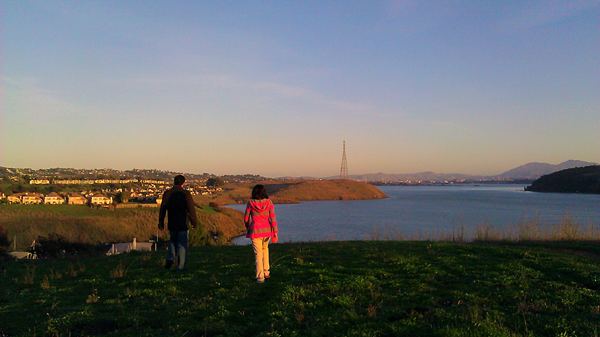
Along the hiking trail outside our condo.
My beloved sweepthesunshine.com has been resurrected with upgrades and updates, and, in scrolling back through old posts, I wish I had written more over the last 12 months, if only to have a coherent record of what was quite possibly the most challenging yet rewarding year of my life.
My husband has said often over the past year, “I want you to start updating your blog again.”
“Why?” I tease, “So I can write stories about you and Lemon?”
“No, because I want your life to be about more than just being a mother to Lemon and wife to me.”
At the core of it, last year was about marriage and motherhood, moving and settling into a new home, finishing a Master’s program, unemployment and job-hunting. As 2012 wound down, I found myself grateful for many things: That, close to the end of the year, I accepted the offer of a permanent, full-time position in San Francisco. That, three years after we first met and almost a year into our marriage, my husband and I were no longer in a long-distance relationship — that the distance we hated for so long has now simply become the space our arms need to cross for us to hug one another. That I have managed to survive motherhood (so far) with my heart and my patience still intact, although stronger and sterner now than I have ever known myself to be.
I thought nothing could be harder than job-hunting as if it’s a full-time job, but it turns out parenting is. Now that I look back on it, 2012 seems a blur — I barely remember anything about the wedding, the move, decorating and learning to love this condo, the struggle to get out of bed some mornings when job-hunting seemed like such a futile exercise and a long-distance marriage felt lonely. What remains bright and memorable is deciding to have Lemon, my stepdaughter, come live with me in August of last year, while my husband remained for the time being at his job in Las Vegas, his hometown.
My friends and family were thrilled with this necessary first step towards having me and my little family reunited in one place. The Lovely L Lady said, “I love you being Lemon’s mom.”
And C wrote, “I’d love you if you were my mom/stepmom. She is a lucky girl to have you!” When I admitted that, actually, I had no idea what I was doing, C, being a mother-figure herself, advised me:
“Set firm boundaries, clear expectations, clear negative consequences, so they know what to expect — although try to focus on their positive behavior — and follow through on it.”
It seemed like such a perfect, beautiful, simple summary of good parenting — but so difficult to implement when the time came. Still, in the months that followed, C’s advice provided a roadmap that I tried to follow.

Playing one of our endless games of Monopoly.
Nearly overnight, I was entrusted with the care of a 9-year-old girl. And not just simple caring, but mothering. Did I overestimate how smooth a process I thought it would be? Possibly. And did I underestimate my patience and abilities? Yes. After all, I am proud of the mother I am, the family we’ve become. I knew Lemon and I would settle into our routines and expectations soon enough, and I didn’t realize that once that initial transition period was over, it would all, mercifully, feel like a blur. Mostly, I remember only the good things now — and because of that, it’s probably a blessing that I didn’t keep a written record of those days.
I taught Lemon to brush her teeth at least twice a day, to make her bed and hang up her bath-towel, to wear deodorant. Dirty clothes were never to be re-worn out of the clothes hamper, a spritz of perfume was not adequate substitute for a shower, and toys had to be cleared away before bedtime. Also: tomatoes were not evil, every food at the dinner table had to be tried at least once before she complained she didn’t like it, she wasn’t allowed to leave the table without finishing whatever was on her plate, and no, Ritz crackers didn’t constitute lunch. (All these things make me laugh now, but imagine the frustration at the time!)
Along the way, I somehow became the designated spider-killer extraordinaire, particularly on weekday mornings when we were all bleary-eyed and cranky, or nights when Lemon pushed her bedtime (“It’s time for you to sleep now, Lemon.” “Meemo, I see A SPIDER behind the door!”) She calls me “Meemo,” a nickname she and my brother-in-law invented together one afternoon based on my middle name.
I also became the post-dinner dessert-maker, the school-lunch maker, and the arts&crafts production assistant (I once sewed, by hand, a tiny backpack for Lemon’s Barbie doll, and, in the wide-eyed gratitude and compliments that followed, I felt like the most rockstar mother in the world).

I am bemused by the number of Barbie dolls that have invaded my home.
Only Lemon, in the midst of her doing her homework or chores, could look up and ask very formally, “Meemo, can we put on some entertainment?” Only Lemon, with the sheer exuberance that characterizes her personality, could manage to pull me off the sofa and dancing in the middle of our livingroom — I, who am so convinced of my lack of physical coordination that I avoid the dancefloor at even my friends’ weddings. I thought I was a huge Darren Hayes fan, but that was before I introduced Lemon to his music. We have listened to “Bloodstained Heart” so many times, we have every single lyric and beat of music memorized, and Lemon, future cinematographer, has filmed me singing the song while driving her to school, while eating dinner, and while making peach strudel for dessert.
One of the loveliest moments of our life together was when Lemon accompanied me to a Love, InshAllah reading at my alma mater. Lovely, but surreal. All those years ago (2003!), when I started this blog and wrote incessantly about my life as a college student, never did I think I would return to campus as a wife, a stepmother, and a contributor to an anthology I lovelovelove. Lemon sat in the front row at the reading, beaming at me the entire time, particularly when I stood up to read my excerpt. Afterwards, she tentatively but very adorably asked if she could join us in the book-signing. How could we resist? “You’re awesome!” she wrote in audience-members’ books.
At my best friend’s bridal shower last fall, I had a great conversation about relationships and motherhood with her cousin, a Love, InshAllah fan and almost-contributor — then had to rush home to have Lemon’s mother over to our home for the first time. Debriefing about it later, I realized I would have felt rather awkward in her position — especially with me chattering away obliviously, “Here’s Lemon’s room and bathroom! And here’s my bedroom and bathroom!”, all the while standing in front of framed photos of me and my husband…not to mention, Lemon interrupting us with a copy of the Love, InshAllah anthology in her hands, excitedly babbling: “Look, Mommy! This is the book I was telling you Meemo wrote!” At the time, it was all strange and disconcerting — yet another surreal moment in the endless string of surreal moments that make up parenting. The next day, and now, I couldn’t help but laugh.
I have zero hang-ups about displaying my own artwork, and so my photographs hang everywhere in our home. Lemon never fails to remind me, “I want to be a photographer, like you!” She herself is naturally creative, as children always are, and so, besides the singing and dancing, we also do a lot of arts&crafts together. Rare is the day when I am not bombarded with questions such as: “Meemo, can you teach me how to draw?” “Meemo, how do you fold accordion-style?” “Meemo, can you help me glue the roof on a gingerbread house for my dolls?” Today, she made me a list of items she needs for replenishing her stash of art supplies:
– wooden dowels
– pipe cleaners
– ribbon
– foam
– beads
– elastic
– cardstock
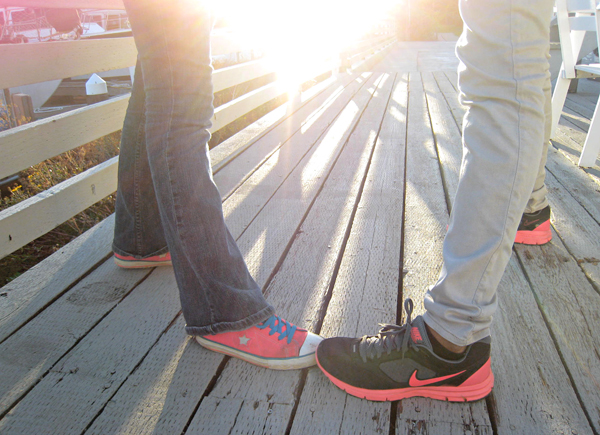
Apparently Lemon and the Lovely L Lady share an appreciation for fluorescent-pink shoes.
Autumn came late to the San Francisco Bay Area last year, and so we hung suspended in a deliciously prolonged summer for months. Lemon and I spent much of September and October at the pool and hot tub across from our condo, where I watched her practice her swimming. One Saturday morning, a lady named Dottie was there with her little grandson. We pulled our lounge-chairs closer and got to talking, and Dottie told me about her sister, who, long ago married a man with two young children from a previous marriage. They all fell in love, the kids adored her, a third child was added to their little family, and then Dottie’s sister, only 30 years old, suddenly passed away a year after her baby’s birth. “She had such a big heart,” Dottie reminisced.
She looked at me and said gently, “You have a big heart, too. Your daughter is going to remember all this.” I almost burst into tears at the side of the pool, all the while watching Lemon happily waving at me, the sunlight reflecting off her smile. Those were still the early days of parenting, when I wondered if I were in over my head. I hoped to God that Dottie was right.
In those days, my husband said often to me, “I hope motherhood has some joys in it, too, for you. I hope it doesn’t take away from who you are.”
I could never think of anything to say in response.
Once, he pointed out gently, “You’re different now — not in a bad way, but just different. Before, all you talked about was gelato and highfives and rockstars.” I found myself blinking back tears. I missed who I had been, even as I was simultaneously proud of who I had become. There were a lot of tears, frustration, a lingering sadness I carried around with me during those first few months of being a hands-on parent and constant rule-maker and enforcer. But then friends would say, “You’re doing a great job,” and the weight would lift, briefly.
Even Lemon’s mother and aunt said to me, “You have a good heart, and you’re doing a wonderful job with Lemon.” Her mother has said repeatedly, “Thank you for taking care of her. I’ve got nothing but prayers for you.” In my first week of parenting, as I marched forward armed with lists and schedules and intentions (even as I had no idea what I was doing), Lemon’s mother marveled, “You’re doing great, as if you are a mother already!” I am truly happy to have her trust and support in this process of raising Lemon.
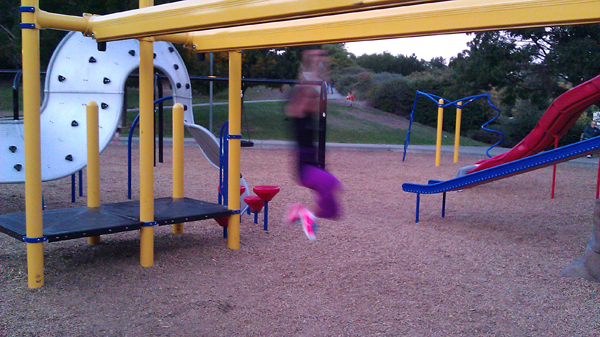
Lemon in perpetual motion, as always.
One of the most favorite traditions Lemon and I instituted last year was to read together at bedtime. When I was a child, one of my favorite books was called Sarah, Plain and Tall, about a woman who comes from Maine to the Midwest as a mail-order bride for a widower with two young children. One night, Lemon insisted on switching our roles and reading out loud to me at bedtime — and the book she chose was called Skylark, the sequel to Sarah, Plain and Tall. (Did you know there’s a sequel?! I didn’t!)
I told Lemon she could only read 2 pages, as it was already past her bedtime — but it was so lovely listening to her, I let her read for 20 pages more. The story moved me, because of the obvious parallels to my own: stepparenting and blended families; a woman from a place of greenery and ocean; a man from a dry, dusty, drought-riddled land.
When she finished reading, Lemon put her book away, and said, “Meemo, when my dad asked me, ‘What do you think if Meemo marries me?’, I should have said something different.” (Her real answer: “You belong together.” Yes, really.)
“What would you have said instead?” I asked curiously.
“I should have said, ‘You should get married because you have the same name: Yas/Yas, you’re the same age, and you’re beautiful together, like –’ ” she paused thoughtfully. “‘LIKE SHAMPOO AND CONDITIONER!’ ”
Needless to say, the laughter went on far past her bedtime.

My two loves running down the hill to the marina.
In November, my husband moved to the Bay Area to join me and Lemon, and we all eased into a shared life together. It felt like a long, calming exhale. Lemon was sweeter, kinder — the Lemon I knew when I was getting to know her father. I was lighter, gentler, more full of laughter. Being together as a family brought out the best in all of us.
Lemon is now 10-years-old, and already five feet tall (just an inch shorter than I am!). She knows far too much about pop culture and social media. Next year, she starts middle school, a thought which completely freaks me out. In the meantime, as 2013 continues to unfold at seemingly supersonic speed, I pray my little family and I settle even more deeply into the foundation we’ve laid the last few years. I am not a perfect mother, and I know no one expects me to be — but with Lemon I am sometimes impatient, often stern, and I always have high (too high?) expectations. And so, I pray for more joy and gratitude, more singing while cooking and driving, more spontaneous (and wholly terrible) dancing on the livingroom floor.
[+]
It is a testament to how perfect my husband is for me that one night last winter, during a rare moment when I broke down and cried through the insecurities I felt as a stepmother, he quietly went out to the living room and returned holding a copy of Fahrenheit 451 by my favorite writer, Ray Bradbury. He flipped through the pages until he found the passage he wanted, then read out loud to me this reminder of my tiny victories and long-lasting accomplishments as, no, not a stepmother, but a mother:
“Everyone must leave something behind when he dies, my grandfather said. A child or a book or a painting or a house or a wall built or a pair of shoes made. Or a garden planted. Something your hand touched some way so your soul has somewhere to go when you die, and when people look at that tree or that flower you planted, you’re there.
It doesn’t matter what you do, he said, so long as you change something from the way it was before you touched it into something that’s like you after you take your hands away. The difference between the man who just cuts lawns and a real gardener is in the touching, he said. The lawn-cutter might just as well not have been there at all; the gardener will be there a lifetime.”
[+]
Besides the beautiful, endless support of my family and friends (those who are childless, as well as the few who are parents and stepparents themselves), I have been lucky to find inspiration and companionship in a few pieces of writing I’ve stumbled across during the past year:
